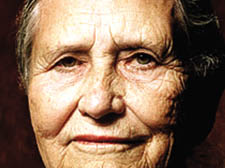|
|
 |
| |
Man does...woman is in Doris’s war of the sexes
I looked for humour and irony in Doris Lessing’s latest novel – but found neither writes Piers Plowright
DORIS Lessing is a bold writer. In this, her 18th, novel, she re-imagines the creation of Man. Only this time, Woman comes first. The Clefts, an ancient community of women living in a torpid Eden, lolling about on rocks at the edge of the sea, are doing very nicely without men.
Childbirth is controlled by the cycles of the moon and all the babies are girls. Until, one dark day a boy comes along; a strange, disturbing, thing, with unknown bits sticking out of it, and the good times are over. The boy-children, called “Monsters”, are first left out to die or ill-treated and mutilated within the female community. But then a flock of forward-looking eagles rescues some of the “Squirts” – an alternative name for “Monster” – and dumps them in a nearby valley, where they grow up without women, suckled by friendly deer. It’s not long, of course, before curiosity gets the better of both Clefts and Squirts, and intermingling, pregnancy, birth, and a rough kind of family life much to the disgust of the Primal Feminists, the “Old Shes” – become the norm.
This epic tale filters through to the reader via an Ancient Roman senator, driven by fear of death into becoming a historian. It’s he who deciphers and annotates the sometimes messy goings-on.
In a short foreword to the novel, Doris Lessing explains that a recent scientific article, putting forward the idea “that the primal human stock was probably female and that males came along later, as a kind of corrective afterthought”, chimed in with thoughts she was already having about men and women, and the book was born. Lessing had already hit the headlines at the 2004 Edinburgh Festival when she was strongly critical of what she saw as “the putting down of men” in contemporary western culture, and it was clear that sooner or later she would write about the “sex war”. Well, she’s done it.
Beware of novels with a thesis was what my English master at school taught me and – if The Cleft is anything to go by – he was right. In spite of flashes of fine description and some dramatic action scenes – the horrifying gang-rape and murder of the first Cleft to find her way into Squirt territory, for example – the novel falls under the weight of its own argument, or lack of it. Because, what is it really about? If it’s about feminism, this is a really old-fashioned take on it. If it’s about science, it would have been better as an essay or an article. If it’s about the process of history, no new patterns or insights emerge.
I looked in vain for irony, for a flash of humour, for a single character I could care for.
Not that Lessing is trying to please her readers. That’s never, to her credit, been her concern.
“I don’t think it fits anywhere at all with my other novels,” she said in a recent interview, “..it’s probably not a very easy book for some people.”
Well it certainly isn’t for me. I can see something interesting trying to get out – the epigraph to the book is a quote from Robert Graves: “Man does, Woman is”, an unfashionable statement , which Lessing backs up when she says, in the same interview: “Men are restless, adventurous.
“Women are conservative – despite what current ideology says.”
But then she goes and writes this inflated folk-fable, that reads in some places like Doctor Spock and, in others, like a first draft for a Cecil B De Mille 1950s film epic.
There’s no doubt that Doris Lessing is a fine writer and that her place in English literature is established, but I hope this isn’t going to be her last novel. It would be a sad note to end on for the writer of The Golden Notebook, The Grass is Singing, The Sirian Experiments, The Black Madonna, and Play With A Tiger, as well as poetry, essays, and two fascinating volumes of autobiography.
As I struggled to the end of The Cleft, I realised what it reminded me of one of Rudyard Kipling’s Just So Stories, only hideously over-extended and without the jokes.
|
 |
 |
|
 |
|


